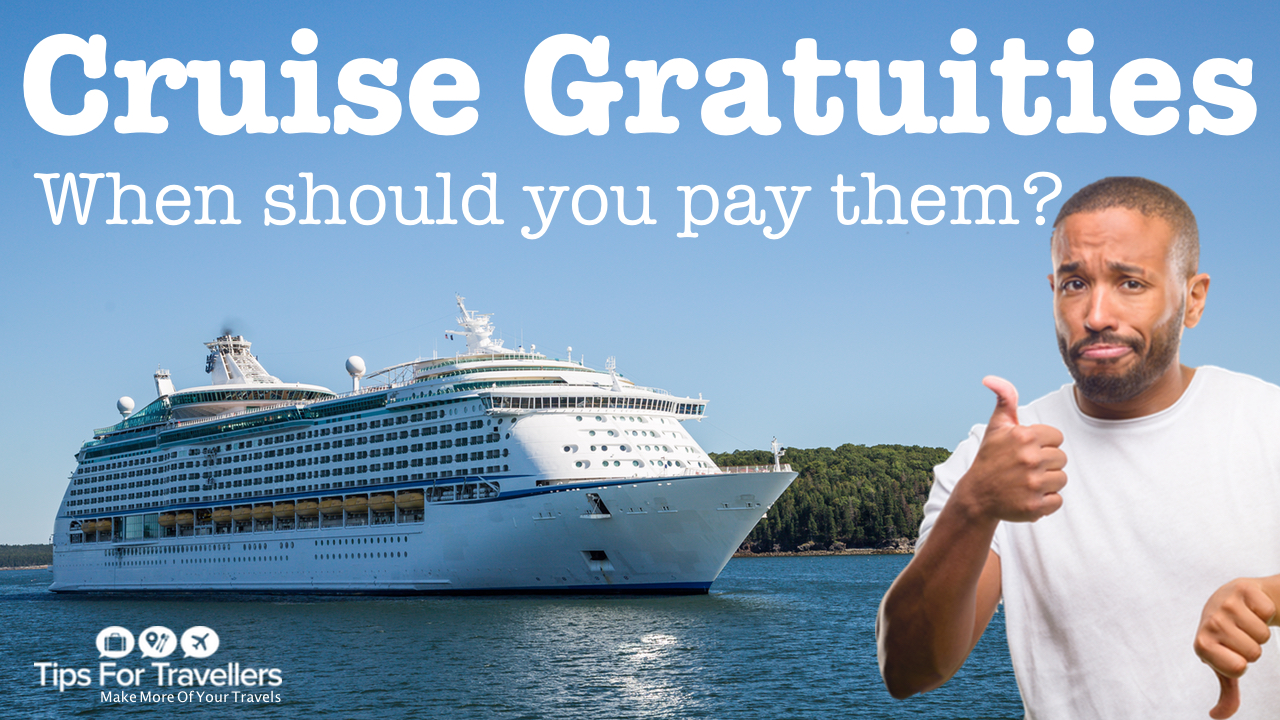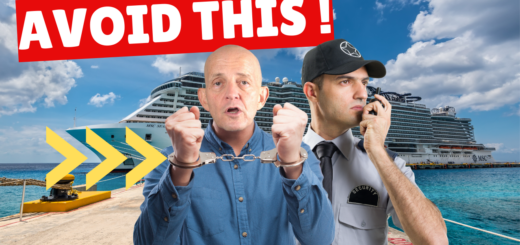When Should You Pay Cruise Gratuities? And When Not?

When should and shouldn’t you pay cruise gratuities? This is one of the more controversial and hottest topics in the world of cruising. In my video I explore six things you need to know about cruise gratuities including what they really are, how cruise lines use them and where they really go.
Watch My Cruise Gratuities Video
Watch on YouTube: https://youtu.be/QBYzqxXjEXQ
Should You Pay Cruise Gratuties?
In this article I explore six things that you need to know about cruise gratuities and, very importantly, whether you should pay them.
#1 What are gratuities?
A gratuity is supposed to be, and its original definition is, a tip or a bonus that you give to somebody if they’ve gone above the norm and given you exceptional service. However, increasingly it’s become something very different and become the norm, which is why so many people are getting upset about it.
#2 How do cruise lines take gratuities from passengers?
When it comes to gratuities there’s three approaches that most cruise lines take:
- Gratuities are included within the price of a cruise. That tends to be more common on upmarket cruise lines. The ultra-luxury lines often include the gratuity and will say that gratuities are not expected by any of the crew. More mainstream cruise lines are starting to include them, with cruise lines like P&O Cruises and Marella Cruises in the UK including them within the overall fare.
- The more common approach is they are auto-added or you’re asked to pay for them in advance. When you book your cruise, you’re frequently given the option of paying them in advance or once you’re onboard they are auto-added to your bill. You can, of course, go to the Guest Services Desk and ask to either increase or decrease the amount of gratuities, but they are pushed through by the cruise line either by getting you to pay them upfront when you pay your final balance or by just adding them on to your on-board account and taking the money off your credit card at the end of the cruise. This causes much discussion because there are rumours that lists are put up telling the crew which cabins or people have asked for gratuities to be removed. I don’t have any evidence of this, although there are anecdotal stories.
- The approach which used to be more common on cruise lines, and is largely gone although you do see it quite a lot when river cruising, is you’re offered or encouraged to decide if you want to pay them and you can either hand them over as cash to individual members of the crew or into a box where gratuities are pooled.
When I started cruising that last one was much more common, you were given envelopes and some guidelines by the cruise line. You put cash in them and give one to each of the members of the crew that you wanted to. The second approach, where cruise lines encourage or force you to pay gratuities, is much more common these days.
#3 Significant add-on cost
Gratuities can add a lot of cost on to the price of your cruise. Most cruise lines set a gratuity between $12 and $20 per person or per day, and that also applies to children. So, if you’re a couple, it can add between $150 and $300 for a seven-day cruise (around £150 to £250 and about the same in euros). If you’re travelling as a family, with two adults and two kids, you could be talking many hundreds added on to the cost of your holiday. And cruise lines frequently increase the amount that they recommend gratuities should be.
#4 Crew wages and who gratuities really go to
Why has the topic of gratuities become so controversial? A lot of the concern is around how crew members are recruited and paid. Gratuities have become a fundamental part of crew wages.
Cruise lines are registered in ports of convenience, which mean that they do not have to follow the labour laws of places like the US, UK or countries in Europe. They register them there to follow more relaxed and less strict labour laws and where there are no minimum wage laws. The view is what cruise lines do is they recruit crew from the Far East, like the Philippines, Indonesia and India, and pay them at a low rate and use gratuities to top up and give the crew members a fairer wage. All the cruise lines are doing is using gratuities as a way of giving the crew members a better wage.
There’s concern whether the money that cruisers pay through auto-gratuities or prepay all gets to the crew members, and that cruise lines keep some for their profits or supplement more senior crew or senior managers bonuses. There is a feeling that gratuities are not getting to the people that actually do the work and cruisers interface with on a day to day
basis.
Gratuities are, in my view, becoming a tax because what the cruise lines are really doing is offering a fare which looks much low but, once you actually go on the cruise, they auto add gratuities so effectively adding cost to the real fare level. Of course, you can take them off but all they may be doing is hiding the fact that your cruise is actually costing you much more money than you think it’s going to cost. So, instead of paying the crew a higher wage they’re using gratuities as a way of making the fare look lower but still making paying more money than the fare appears to be. The gratuities are used to pay the crew a better wage, and it’s not really for improved service.
#5 When should you not pay gratuities.
Here are the reasons that I see most cruisers argue when you shouldn’t pay.
- When you cannot afford it as it’s an extra cost on your cruise. Of course, many argue against that because by doing that you’re denying the crew a fair wage, and by removing gratuities you’re getting the crew to subsidize the cost of your trip.
- When they are already bundled into the fare. There’s no need to pay extra because it is covered. Of course, you may decide you want to because someone’s giving you extra service, so it genuinely returns to what a gratuity was supposed to be.
- You shouldn’t pay them when you’re buying things like drinks or using the spa, as gratuities are added onto these at time of purchase (including drinks packages). Usually on a cruise line when you buy a drink or use the spa, you’ll find that a gratuity of about 18% is added. You shouldn’t then pay an additional gratuity on top as it has been added.
- You shouldn’t really pay extra for services from crew included in the pre-paid or auto-added gratuity This includes if you put your kids in the kids’ club or someone comes and fixes issues in your room. No need for an extra gratuity.
#6 When should you pay the gratuity?
- It depends on your view around whether you believe that gratuity is part of your overall fare and by paying them all you are doing is making sure that the crew members who deal with you are getting a fair or better wage than they would if you don’t pay the gratuity. Then you could also pay extra in cash to individuals providing phenomenal service or who went beyond what you would normally and reasonably expect, and you want to acknowledge that.
- Another reason for paying into the gratuities through the central process is nowadays cruisers tend not to eat in the same restaurants. With so many dining and speciality venues we don’t have the same server all the time so by paying the gratuities into the central pot makes sure that all that have served you across your cruise are actually getting some kind of recognition of the services they provided.
- To people that do not part of that bigger pot. For example, people who work in the casino, people running the tours and the bus drivers and porters. Many ultra-luxury lines do build these into the overall fare.
Final Thoughts
Gratuities are always going to be a controversial part of cruising, particularly when they are auto-added and the cruise line is almost forcing you to pay. They’ve almost add it as a tax.
It is not really a gratuity, it’s become an additional charge that is really part of your fare. When we go out looking for cruises, we often look for great fares. This encourages the cruise line to under pitch the fare knowing they’re going to catch it up in gratuity charges.
What you need to bear in mind with gratuities on a cruise line is you’re probably not going to get service above and beyond because they have just become part of the fare.
Gratuities are a very hot topic and I would love to hear what you think. Do you auto pay them? Do you take it off and pay people in cash? What is your view about gratuities and how do you think cruise lines should handle it?
Subscribe to Tips For Travellers YouTube Channel (click image):
Follow Tips For Travellers:
- Follow Tips For Travellers on: YouTube, Instagram, Facebook, Twitter and Pinterest.
- Sign up for the monthly newsletter. includes a free eBook to download every month.
- Never miss a post by signing up below and every new post will be sent direct to you.















It is the cruise company’s responsibility to pay fair wages to their staff and using the line that if we take them off we are punishing the employee is unfair and a nasty attempt to guilt trip the cruiser. Our first cruise we used the auto gratuities but since then have taken them off and given cash to those that we want to. It needs to be done away with and is an inciduous American big business ploy to make more money off the generosity of others.